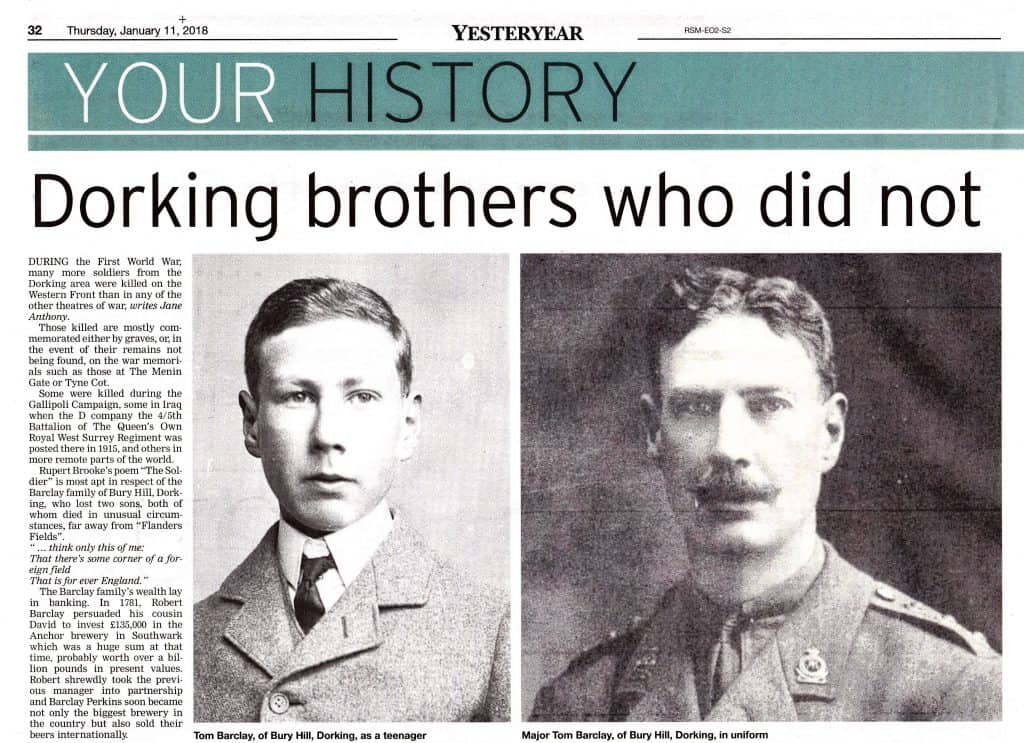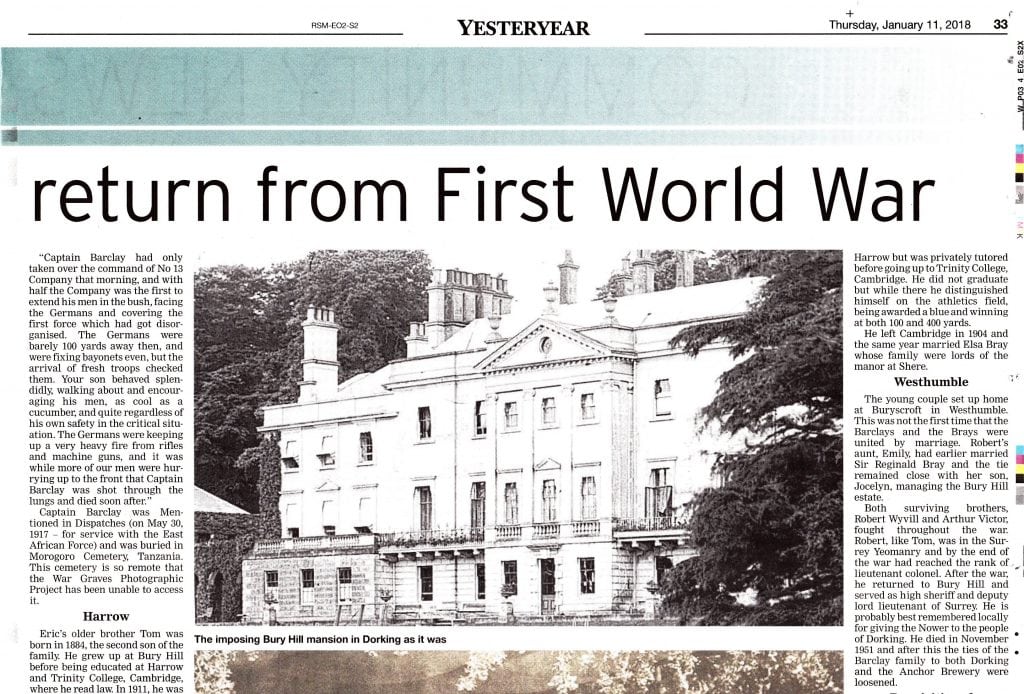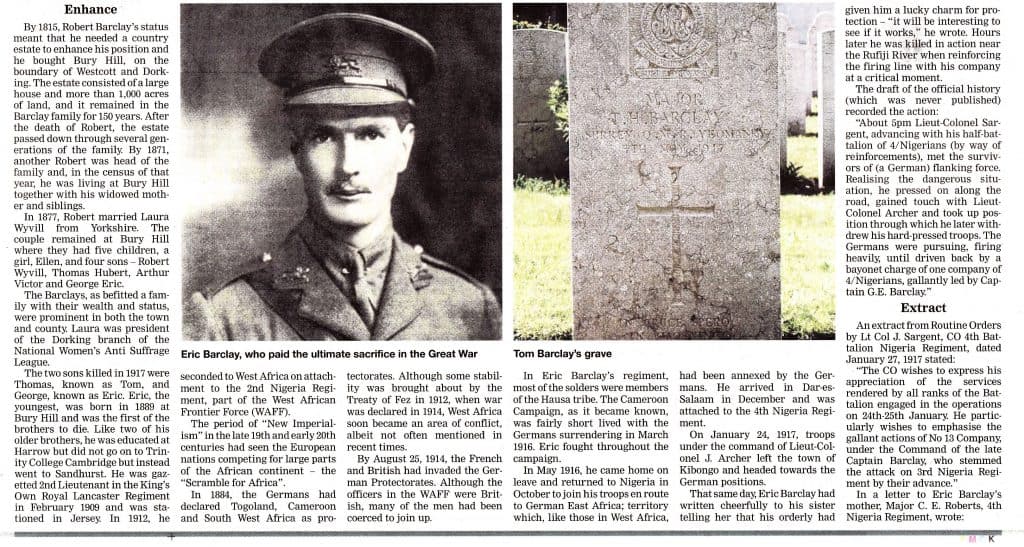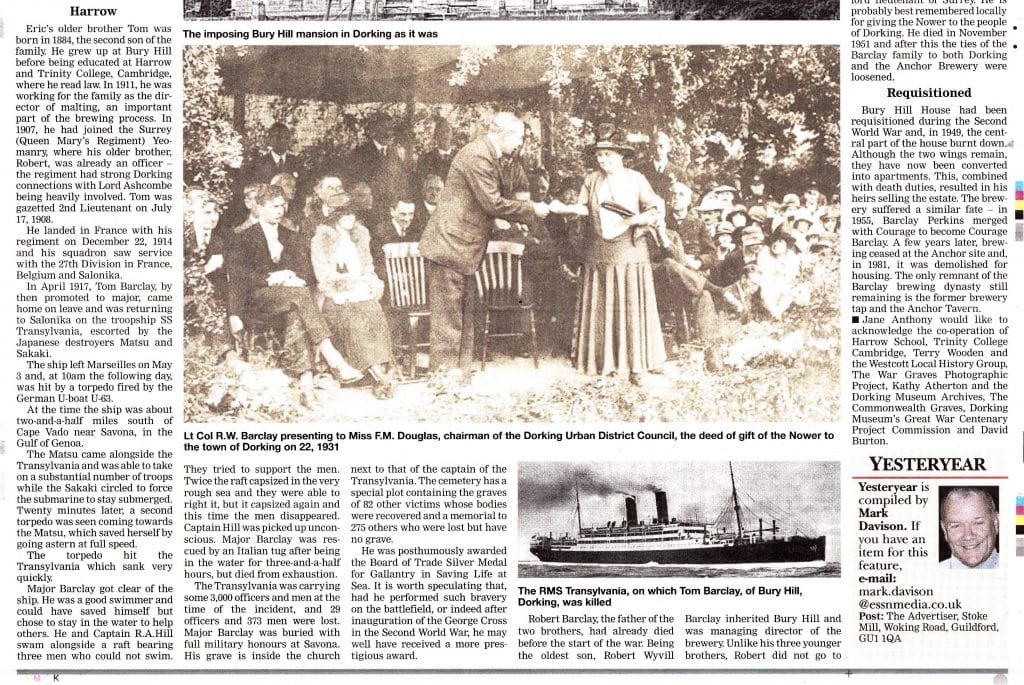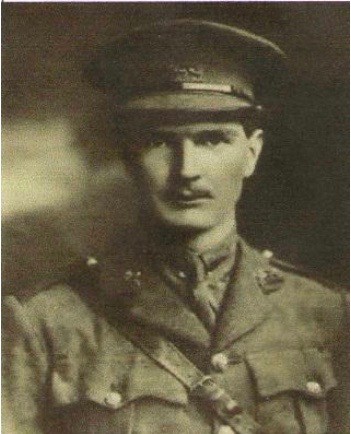
Thank you to Westcott Local History Group for allowing Dorking Museum to publish their First World War research.
George Eric Barclay was born in 1889, the 4th son of Laura Barclay and the late Robert Barclay of Bury Hill. He was educated at Harrow and the Royal Military Academy, Sandhurst. He was gazetted 2nd Lt in the King’s Own Royal Lancaster Regiment in February 1909 and was stationed in Jersey. In 1912 he went to West Africa on attachment to the 2nd Nigeria Regiment and served with them through the Cameroon Campaign.
In May 1916 he came home on leave and returned to Nigeria in October to join troops en route to German East Africa. He arrived in Dar es Salaam in December and was attached to the 4th Nigeria Regiment. On 24th January 1917 a column comprising three Nigerians and one company of four Nigerians under the command of Lieut-Colonel J.Archer left a town called Kibongo and headed south towards the German positions at Ngwembe. That same day Eric Barclay had written cheerfully to his sister telling her that his orderly had given him a lucky charm for protection – ‘it will be interesting to see if it works’, he wrote. Hours later he was killed in action near the Rufiji River when reinforcing the firing line with his Company at a critical moment.
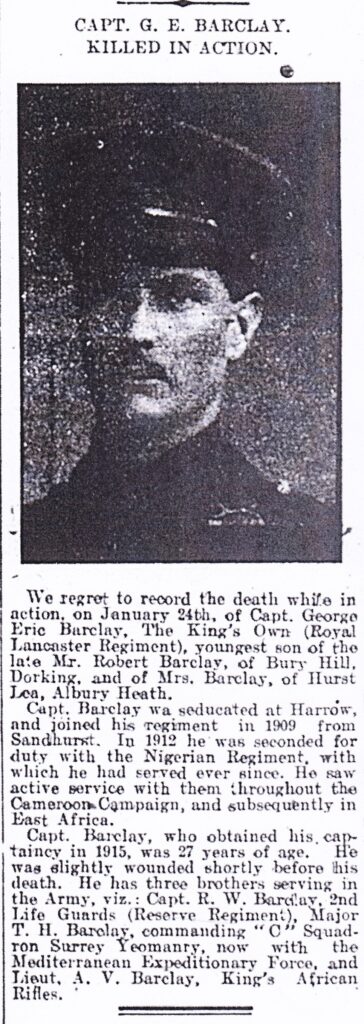
CAPT. G. E. BARCLAY
KILLED IN ACTION
We regret to record the death while in action, on January 24th, of Capt. George Eric Barclay, The King’s Own (Royal Lancaster Regiment), youngest son of the late Mr. Robert Barclay, of Bury Hill, Dorking, and of Mrs. Barclay, of Hurst Lea, Albury Heath.
Capt. Barclay was educated at Harrow, and joined his regiment in 1909 from Sandhurst. In 1912 he was seconded for duty with the Nigerian Regiment, with which he had served ever since. He saw active service with them throughout the Cameroon Campaign, and subsequently in East Africa.
Capt. Barclay, who obtained his captaincy in 1915, was 27 years of age. He was slightly wounded shortly before his death. He has three brothers serving in the Army viz.: Capt. R. W. Barclay, 2nd Life Guards (Reserve Regiment), Major T. H. Barclay, commanding “C” Squadron Surrey Yeomanry, now with the Mediterranean Expeditionary Force, and Lieut. A. V. Barclay, King’s African Rifles.
George Barclay Death Notice © Dorking Advertiser findmypast.co.uk
The draft of the official history (which was never published) recorded the action:
‘About 5 pm Lieut-Colonel Sargent, advancing with his half-battalion of 4/Nigerians (by way of reinforcements), met the survivors of (a German) flanking force. Realising the dangerous situation, he pressed on along the road, gained touch with Lieut-Colonel Archer and took up position through which he later withdrew his hard-pressed troops. The Germans were pursuing, firing heavily, until driven back by a bayonet charge of one company of 4/Nigerians, gallantly led by Captain G E Barclay.’
An extract from Routine Orders by Lt Col J Sargent, CO 4th Bn Nigeria Regiment dated 27th January 1917 stated:
‘The CO wishes to express his appreciation of the services rendered by all ranks of the Battalion engaged in the operations on 24th -25th January. He particularly wishes to emphasise the gallant actions of No 13 Company, under the Command of the late Captain Barclay, who stemmed the attack on 3rd Nigeria Regiment by their advance.’
Major C.E. Roberts 4th Nigeria Regiment wrote these words in a letter to Eric Barclay’s mother:
‘Captain Barclay had only taken over the command of No 13 Company that morning, and with half the Company was the first to extend his men in the bush, facing the Germans and covering the first force which had got disorganised. The Germans were barely 100 yards away then, and were fixing bayonets even, but the arrival of fresh troops checked them. Your son behaved splendidly, walking about and encouraging his men, as cool as a cucumber, and quite regardless of his own safety in the critical situation. The Germans were keeping up a very heavy fire from rifles and machine guns, and it was while more of our men were hurrying up to the front that Captain Barclay was shot through the lungs and died soon after.’
Captain Barclay was Mentioned in Despatches (on 30th May 1917 – for service with the East African Force) and was buried in Morogoro Cemetery, Tanzania.
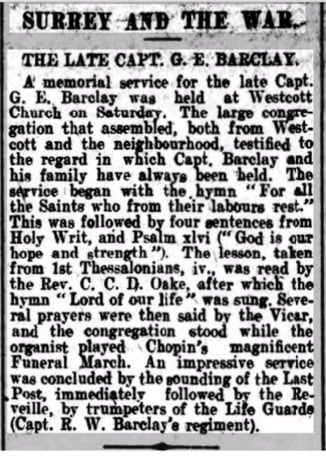
SURREY AND THE WAR
THE LATE CAPT. G. E. BARCLAY
A memorial service for the last Capt. G. E. Barclay was held at Westcott Church on Saturday. The large congregation that assembled, both from Westcott and the neighbourhood, testified to the regard that Capt. Barclay and his family have always been held. The service began with the hymn “For all the Saints who from their labours rest.” This was followed by four sentences from Holy Writ, and Psalm xlvi (“God is our hope and strength”). The lesson, taken from 1st Thessalonians, iv., was read by the Rev. C. C. C. D. Oake after which the hymn “Lord of our life” was sung. Several prayers were then said by the Vicar, and the congregation stood while the organist played Chopin’s magnificent Funeral March. An impressive service was concluded by the sounding of the Last Post, immediately followed by the Reveille, by trumpeters of the Life Guards (Capt. R. W. Barclay’s regiment).
GE Barclay Memorial Service 6th January 1917 © Dorking Advertiser findmypast.co.uk
| Born | Bury Hill, Westcott, Surrey | |
| Lived | Bury Hill, Westcott, Surrey | |
| Son of | Laura Charlotte Rachel Barclay of ‘Hurst Lea’, Albury Heath, Surrey, and the late Robert Barclay of Bury Hill, Westcott |
|
| Brother of | Thomas Hubert Barclay | |
| Regiment | King’s Own. Royal Lancaster Regiment | |
| 4th Battalion. Nigeria Regiment. West African Frontier Force | ||
| Date of Death | 24th January 1917 | |
| Place of Death | Nigeria, Africa | |
| Cause of Death | Killed in action | |
| Age | 27 | |
| Cemetery | Morogoro Cemetery, Tanzania |
The following article appeared in the Dorking Advertiser on 11th January 2018.
